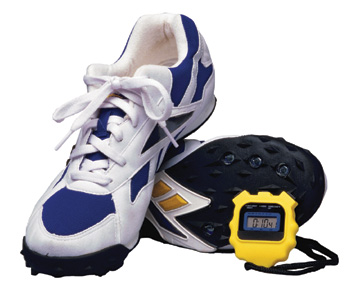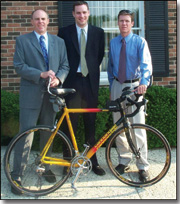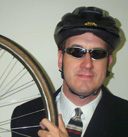 Wisconsin Lawyer
Wisconsin Lawyer
Vol. 75, No. 8, August
2002
Ironman Lawyers
Although training for and competing in an Ironman triathlon is
grueling, the personal and professional benefits are enormous. On Sept.
15, in Madison, seven Wisconsin lawyer-athletes will dig deep within
themselves to compete in the state's first-ever Wisconsin Ironman. These
competitors say that if they can do it, anyone can.
 by Craig M. Witz
by Craig M. Witz
Balancing the practice of law and a personal life is hard work. This
article profiles a group of Wisconsin bar members who have figured out a
way to strike this delicate balance and who are gaining valuable
personal and professional benefits while doing so.
On Sept. 15, 2002, seven Wisconsin attorneys will compete in
Wisconsin's first-ever official Ironman triathlon in Madison. One of
only five such officially sanctioned events in North America, the event
will bring approximately 2,100 athletes from across the country and
around the world to compete in one of the most grueling, and inspiring,
events in the world of sport.
Participating in an Ironman is grueling. Training for an Ironman is
exhausting and time consuming. How do these attorneys find time
to maintain a practice, train for a major athletic event, and have a
personal life?
As a group, these attorney-athletes really don't have much in common.
Their ages range from late 20s to mid-50s. They serve as attorneys in
small, mid-sized, and large firms, as corporate counsel and as
government attorneys. Some of them have newly minted law school diplomas
while others have been in practice for decades. They are single, married
with no kids, parents of small children, and empty nesters. Their fields
of practice include business law, personal injury, real estate, estate
planning, and governmental affairs. Their athletic backgrounds vary;
some have a lifelong history of fitness activity while others are
relatively new to the sport of triathlon or working out.
What they do share is a love of triathlon and an appreciation for the
benefits the sport provides to their professional and personal lives.
And they all agree that any attorney could find the time and energy to
participate in these events.
The Ironman
For those not familiar with the sport, triathlon is a race consisting
of first a swim, then a bike ride, and then a run. Most triathletes
compete in shorter or "sprint" distance events of a quarter-mile swim,
15-mile bike ride, and 3-mile run. Longer "Olympic" distance events
consist of a 1-mile swim, 26-mile bike ride, and 6-mile run. And then
there is the big kahuna - the Ironman - the ultimate event in the
sport.
Legend has it that the Ironman was born over an argument in a Hawaii
drinking establishment. A group of Navy Seals was arguing about who were
the fittest athletes in the world - swimmers, cyclists, or runners. They
resolved that there was only one way to find out and that was to do all
three at once. So on Feb. 18, 1978, 15 competitors decided to put
themselves to the test by swimming 2.4 miles, biking 112 miles, and then
running a 26.2 mile marathon - the now well-established standard Ironman
race distances. From those humble beginnings, the sport of Ironman has
evolved into an international phenomenon with 18 sanctioned races
worldwide.
Training and Time Management
As you might imagine, training for one of these events is a massive
effort requiring many hours in the pool, on the bike, and out on the
run. And all of our Ironman attorneys need to balance that with
substantial hours behind the desk. What is the secret to finding time to
get in the training and still maintain a practice and a personal
life?
Our attorney athletes train year round and average between eight and
12 hours per week. During the couple of months immediately prior to the
Ironman those hours can spike up to 20 to 25 hours per week. It might
surprise some that none of the attorneys interviewed said that training
time compromises their law practice. But it does require them to adopt a
"flexible regimen" to get in the hours. Some work out every day before
work, or at lunch, or after hours. Others know how many hours a week
they have to work out and squeeze in the time as they can during the
week and make up the rest on the weekends. And there are trade-offs;
more time working out and less time going out for beers after work or
sitting in front of the TV.
Steven Cain, an attorney with Houseman & Feind LLP in Grafton,
admits it can be tough to find the time. "Some days you just can't do it
- but you find the time elsewhere" and, he adds, "the key is to plan,
plan, plan." Cain, 28, is the youngest of the Ironman attorneys from
Wisconsin. Wisconsin Ironman will be his third Ironman event, having
successfully competed in Ironman Florida in 1999 and 2000.
Everyone agrees that it also is important to have a supportive family
and work environment that allows you to juggle your schedule to fit in
the workouts.
The Time Commitment is Worth It
All of the Ironman attorneys agree that there are substantial
personal and professional benefits from participating in these races.
Cain notes that he has more endurance to get through the day, feels
better, and has less stress.
Stephen Hartman, a partner in the Trapp & Hartman firm in
Brookfield, recites a long list of benefits: "more endurance, a higher
level of energy and focus at work, I can get by with less sleep, I've
got less stress, it lowers my blood pressure, and most importantly, it
allows me to eat frozen custards whenever I want!" Wisconsin will be
Hartman's first Ironman event. However, at 53, Hartman is not a newcomer
to endurance events. A runner since the 1960s, he has completed 10
marathons and 11 ultra-marathons ranging from 31 to 50 miles. He adds
that long runs focus the mind and "I've done some of my best thinking
while running." He notes, "Participating in endurance sports have given
me balance, and I am a better attorney and person for it."
Wisconsin Ironman Lawyer Participants
- Jon Becker, 31, Madison
- David Braithwaite, 56, Madison
- Steven Cain, 28, Grafton
- Stephen Hartman, 53, Brookfield
- Donald Locke, 30, Milwaukee
- Tom Larson, 32, Madison
- Michael Miller, 34, Madison
- Craig Witz, 43, Madison
David Braithwaite's enthusiasm for triathlonsis infectious. An
attorney with the Wisconsin Division of Hearings & Appealsin
Madison, Braithwaite is the oldest of our attorney athletes at 56. He
was active in triathlons in his 40s, took a decade off, but got back
into the sport last year so that he could compete in his first Ironman
event in his hometown. According to Braithwaite, the benefits are many.
"It is a wonderful feeling - I feel great mentally and physically and
have a lot more energy." He has competed in many three-quarter and full
marathon events, including the Boston Marathon. Braithwaite also
appreciates the support of other triathletes he has met while training.
"Everyone is encouraging and helpful; it is like we are not competing
against each other but against the course - it's great."
Donald Locke, an attorney with the James T. Locke Law Offices in
Milwaukee, notes that triathlon training is a great stress reliever and,
because he is training in three different sports simultaneously, that it
hones his time management skills. Locke states, "The focus is on
quality, not quantity." With several marathons under his belt, including
the Boston Marathon, Locke got into triathlons four years ago
specifically with a goal of completing an Ironman. This will be his
second Ironman event; he successfully completed the Lake Placid event in
2001.
Tom Larson, director of land use and environmental affairs with the
Wisconsin Realtors® Association in Madison, sums up the
benefits. "The balance makes you a better attorney." This will be
Larson's second Ironman. He also completed the Lake Placid Ironman in
2001.
Race Day
Ironman Wisconsin will start with the participants lined up for a
mass swim start in Lake Monona. For Locke, this is the toughest part of
the day - the anxiety and prerace jitters, knowing he is about to
compete against some of the fittest people in the world in an all-day
event.

Steve Hartman, Steven Cain (above and on next page), and Donald Locke
tout the benefits of triathlon training: more endurance, less stress,
and an overall feeling of well-being.
At 7 a.m. the starting cannon is fired, and all hell breaks loose. If
you haven't swum with 2,000 other people, imagine trying to swim in a
blender - that's what it's like. It is a mix of arms and legs flailing
through the water in controlled confusion. You don't take it personally
when the guy passing you from behind clobbers you on the head, because
you probably did the same thing to the swimmer you just passed. The
fastest swimmers will finish the 2.4 miles in roughly 45-48 minutes,
while the average swimmer will take between 1 hour, 10 minutes to 1
hour, 15 minutes. Athletes have 2 hours, 20 minutes to complete the swim
(until 9:20 a.m.).
After the swim athletes will head to the transition area at Monona
Terrace to change into cycling gear and head out on their bikes. The
112-mile bike course traverses the rolling hills around Verona, Mount
Vernon, Mount Horeb, and Cross Plains. On a bike, these "rolling hills"
become steep inclines best described as punishing, tortuous,
unforgiving, and [bleep]. The fastest athletes will finish the bike
course in 4 hours, 30 minutes to 4 hours, 45 minutes, typically
finishing at about 12:30 to 12:45 p.m. The "average" cyclist will take
about 6 hours, 30 minutes to 7 hours to finish the bike course. Athletes
have until 5:30 p.m. to finish the bike ride. For Cain, the toughest
part of the day is about mile 90 on the bike. "Your toes are getting
numb in your bike shoes, and you start to think about that marathon
ahead of you."
Following the bike segment, athletes again head to the transition
zone, to drop off their bikes, change into run gear, and head out on the
final leg of their day - a 26.2-mile marathon through Madison, down
State Street, and across the University of Wisconsin campus. The top
Ironman triathletes can finish the run in 2 hours, 40 minutes to 2
hours, 50 minutes. The average triathlete takes about twice that long,
from 4 hours to 4 hours, 30 minutes, to finish the run. Cain and Larson
note that at about mile 13 on the run, things can get pretty rough.
Those who pushed too hard earlier in the day start dropping off. And
your body starts telling you, if it hasn't already, that it is time to
stop.
 Craig M.
Witz, Univ. of San Diego 1985, is a real estate development
consultant with an emphasis on seniors housing, and freelance writer,
Madison. As a precondition to allow him to compete in the Wisconsin
Ironman, race organizers will require him to wear a "slow-moving
vehicle" emblem. Email the author at
with your questions about getting involved in triathlons.
Craig M.
Witz, Univ. of San Diego 1985, is a real estate development
consultant with an emphasis on seniors housing, and freelance writer,
Madison. As a precondition to allow him to compete in the Wisconsin
Ironman, race organizers will require him to wear a "slow-moving
vehicle" emblem. Email the author at
with your questions about getting involved in triathlons.
Those who survive will finish the race on Martin Luther King Jr.
Boulevard by the Monona Terrace Convention Center. The top male finisher
typically comes in around 8 hours, 20 minutes to 8 hours, 30 minutes for
total time (about 3:20 or 3:30 p.m.), while the top female finisher
typically is an hour or so after that. Most of the athletes finish
between 11 and 12 hours (6 to 7 p.m.) after starting. But athletes have
until midnight to finish, and some complete the triathlon just prior to
the deadline.
It is fun to watch the leaders of the pack and the professional
triathletes competing earlier in the day. However, according to Hartman,
who used to be the race director for the Lake Front Marathon in
Milwaukee, the real drama and excitement is watching those later
finishers struggle across the finish line and push themselves to new
limits.
Watch the Ironman Competition
If you are interested in watching the performance of these attorney
athletes on race day, Sept. 15, you can join the 20,000 to 30,000
anticipated spectators. If you really want to get close to the action,
serve as one of the 4,000 volunteers needed to put on a race of this
magnitude. For several days prior to the event there will be prerace
festivities at Monona Terrace, including morning swims, 5k runs, and
live entertainment. Details will be provided at www.ironmanwisconsin.com.
Live Internet coverage, and the ability to follow particular athletes
through the day, will be available on race day at www.ironmanlive.com.
Get Involved in Fitness
Are you interested in following in your colleagues' footsteps - if
not into an Ironman, at least into a triathlon or fitness regimen?
According to Cain, "Every average person can do this if they put their
mind to it and set aside the time ... all shapes and sizes can do this."
Hartman adds, "Any attorney could do this."
Jon Becker and Michael Miller are attorneys with Reinhart, Boerner,
Van Deuren, Norris & Rieselbach S.C. in Madison. For both, Wisconsin
will be their first Ironman. This is Becker's first season participating
in triathlons, although he has completed two marathons in previous
years. Miller was active in triathlons during college but only got back
into the sport last year. They both suggest that attorneys get into the
sport via an introductory class or training program offered by local
health clubs, YMCAs, or colleges. Alternatively, newcomers can link up
with a local training group, which usually can be found through a local
bike or running shoe store. Training with a group can improve the
learning curve and adds a social dimension to the training regimen.
Larson recommends getting the whole family involved. His children
have competed in special kids' triathlons often held before large races.
And his wife has volunteered at events in which he has participated.
If you are interested in competing, the Ironman is scheduled to
remain in Wisconsin until 2006, and registration for next year's event
will open on Sept. 16.
While all of our Wisconsin Ironman attorneys are male, 11 female
attorneys from outside Wisconsin will compete in this year's event.
These Ironwomen come from 11 different states, including Alaska,
Florida, California, and Illinois, and Washington, D.C. Their ages range
from 31 to 50. Which begs the question, will one of our readers take the
challenge to be the first female Wisconsin Ironman lawyer in 2003?
Conclusion
Not all of these attorney-athletes have met each other, but among
those who have there is a special camaraderie. Their competitive focus
is not on beating each other but on pushing themselves. For all,
competing in these events provides very real and tangible personal and
professional benefits, and all welcome and encourage other attorneys to
get involved. According to Larson, "This event is not a race against
others, but a race against yourself. So much of this sport is about
heart - it's not about how fast you go but how deep you dig."
Wisconsin
Lawyer
